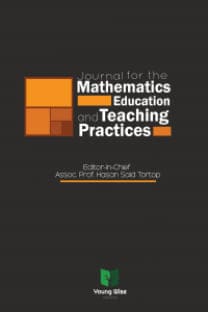An experiment on connecting, organizing, reflecting, and extending (core) learning model and learning styles: the interaction and effects on mathematical communication skills
CORE Learning (Connecting, Organizing Reflecting, Extending), Learning Style, Mathematical communication,
___
- Agustiana, Elma, Fredi Ganda Putra, dan Farida Farida. 2018. “Penerapan Model Pembelajaran Auditory, Intellectually, Repetition (AIR) dengan Pendekatan Lesson Study terhadap Kemampuan Pemecahan Masalah Matematis Peserta Didik.” Desimal: Jurnal Matematika 1 (1): 1. https://doi.org/10.24042/djm.v1i1.1905. Aminah, Siti, Tommy Tanu Wijaya, dan Devi Yuspriyati. 2018. “Analisis Kemampuan Komunikasi Mtematis Siswa Kelas VIII pada Materi Himpunan.” Journal Cendekia: Jurnal Pendidikan Matematika 1 (1): 15–22. Anis, Harisah. 2019. “Model Pembelajaran Kooperatif.” 2019. https://www.tripven.com/model-pembelajaran-kooperatif/. Auliani, Auliani, Karim Karim, dan Rizki Amalia. 2018. “Pengaruh Model Pembelajaran Core Terhadap Kemampuan Koneksi Matematis Siswa SMP Kelas VIII.” Fatimah, dan Luvy Sylviana Zanthy. 2019. “Analisis Kemampuan Komunikasi Matematis Siswa MTs pada Materi Bentuk Aljabar.” Journal On Education 1 (3): 107–12. Haryono, Agus, dan Benidiktus Tanujaya. 2018. “Profi Kemampuan Penalaran Induktif Matematika Mahasiswa Pendidikan Matematika UNIPA Ditinjau Dari Gaya Belajar.” Journal of honai math 1 (2): 127–38. Irawan, Bayu Putra. 2018. “Pengaruh Model Pembelajaran CORE (Connecting, Organizing, Reflecting, Extending) Terhadap Kemampuan Pemahaman Konsep dan Kemampuan Penalaran Matematika Siswa Sekolah Menengah Kejuruan.” Journal of Mathematics Science and Education 1 (1): 38–54. Iriani, Dewi, dan Mutia Leni. 2013. “Identifikasi Gaya Belajar dan Pengaruhnya terhadap Hasi Belajar Siswa pada Materi Kubus dan Balok di Kelas VIII SMPN 2 Kerinci.” Prosiding SEMIRATA 2013 1 (1). Khoeron, Ibnu R., Nana Sumarna, dan Tatang Permana. 2014. “Pengaruh Gaya Belajar terhadap Prestasi Belajar Peserta Didik pada Mata Pelajaran Produktif.” Journal of Mechanical Engineering Education 1 (2): 291–297. Konita, Mita, Mohammad Asikin, Tri Sri, dan Noor Asih. 2019. “Kemampuan Penalaran Matematis dalam Model Pembelajaran Connecting , Organizing , Reflecting , Extending.” PRISMA 2: 611–15. Marpaung, Junierissa. 2016. “Pengaruh Gaya Belajar Terhadap Prestasi Belajar Siswa.” KOPASTA: Jurnal Program Studi Bimbingan Konseling 2 (2). Melya, Lekok, dan Nanang Supriadi. 2018. “Desimal: Jurnal Matematika Analisis Kemampuan Komunikasi Matematis Ditinjau dari Tipe Kepribadian Guardian dan Idealist.” Desimal: Jurnal Matematika 1 (3): 337–45. Muizaddin, Reza, dan Budi Santoso. 2016. “Model pembelajaran core sebagai sarana dalam meningkatan hasil belajar siswa.” Jurnal Pendidikan Manajemen Perkantoran (JPManper) 1 (1): 224–232. Pahrudin, Agus, Nur Ahid, Syamsul Huda, Nita Ardianti, Fredi Ganda Putra, Bambang Sri Anggoro, dan Watcharin Joemsittiprasert. 2020. “The Effects of the ECIRR Learning Model on Mathematical Reasoning Ability in the Curriculum Perspective 2013: Integration on Student Learning Motivation.” European Journal of Educational Research 9 (2). https://doi.org/10.12973/eu-jer.9.2.675. Prasetya, Fajar Dwi. 2012. “Pengaruh gaya belajar terhadap prestasi belajar Mata diklat listrik otomotif siswa kelas xi teknik Perbaikan bodi otomotif smkn 2 depok sleman.” Yogyakarta: UNY. Pratiwi, Gita, Faila Sova, Fredi Ganda Putra, Rizki Wahyu Yunian Putra, Arie Purwa Kusuma, dan Nurina Kurniasari Rahmawati. 2020a. “The Influence of Project-Based Learning (PjBL) and Learning Style Om Mathematics Communication Skills of Junior High School Students.” Journal of Physics: Conference Series 1467 (Februari): 012064. https://doi.org/10.1088/1742-6596/1467/1/012064. ———. 2020b. “The Influence of Project-based Learning (PjBL) and Learning Style om Mathematics Communication Skills of Junior High School Students.” Journal of Physics: Conference Series 1467 (Februari): 012064. https://doi.org/10.1088/1742-6596/1467/1/012064. Ramlah, Ramlah, Dani Firmansyah, dan Hamzah Zubair. 2015. “Pengaruh Gaya Belajar dan Keaktifan Siswa Terhadap Prestasi Belajar Matematika (Survey Pada SMP Negeri di Kecamatan Klari Kabupaten Karawang).” Majalah Ilmiah SOLUSI 1 (03). Siregar, Nur Asma Riani, Pinta Deniyanti, dan Lukman El Hakim. 2018. “Pengaruh Model Pembelajaran CORE terhadap Kemampuan Berpikir Kritis dan Disposisi Matematis Ditinjau dari Kemampuan Awal Matematika Siswa SMA Negeri di Jakarta Timur.” JPPM (Jurnal Penelitian dan Pembelajaran Matematika) 11 (1). Suherman, Suherman, Komarudin Komarudin, Abdul Rosyid, Sinta Aryanita, Doni Asriyanto, Thofan Aradika Putra, dan Tri Anggoro. 2018. “Improving Trigonometry Concept Through STEM (Science, Technology, Engineering, and Mathematics) Learning.” Dalam International Conference On Multidisciplinary Academic (ICMA). Sundayana, Rostina. 2018. “Kaitan antara gaya belajar, kemandirian belajar, dan kemampuan pemecahan masalah siswa SMP dalam pelajaran matematika.” Mosharafa: Jurnal Pendidikan Matematika 5 (2): 75–84. Thahir, Andi, Komaruddin Komaruddin, Umi Nur HASANAH, dan Rahmahwaty Rahmahwaty. 2019. “MURDER Learning and Self Efficacy Models: Impact on Mathematical Reflective Thingking Ability.” Journal for the Education of Gifted Young Scientists 7 (4): 1123–35. Widiyanti, Teti. 2011. “Pengaruh gaya belajar terhadap kemampuan pemecahan masalah matematika.” Yasin, Muhamad, Syamsul Huda, Suherman Komarudin, Reni Septiana, dan Endah Kinarya Palupi. 2019. “Mathematical Critical Thinking Ability: The Effect of Scramble Learning Model assisted by Prezi in Islamic School” Volume 1467. Yasin, Muhamad, Syamsul Huda, Fredi Ganda Putra, Muhammad Syazali, Rofiqul Umam, dan Santi Widyawati. 2020. “IMPROVE Learning Model and Learning Independence: Influence and Interaction on Mathematics Problem-Solving Abilities in Islamic Boarding School.” Journal of Physics: Conference Series 1467 (Februari): 012003. https://doi.org/10.1088/1742-6596/1467/1/012003.
- Yayın Aralığı: Yılda 2 Sayı
- Başlangıç: 2020
- Yayıncı: Genç Bilge Yayıncılık
Chusnul CHOTİMAH, Miftakhul JANNAH
Aan Subhan PAMUNGKAS, Etika KHAERUNNİSA
Fredi GANDA PUTRA, Santi WİDYAWATİ, Komarudin KOMARUDİN, Suci ARYANİ
Rinda Eka PUSPİTASARİ, Mohammad FAİZAL AMİR
Muhammad Noor KHOLID, Cholis SA'DIJAH, Erry HİDAYANTO, Hendro PERMADİ, Rizka Mafida Feby FIRDAREZA
